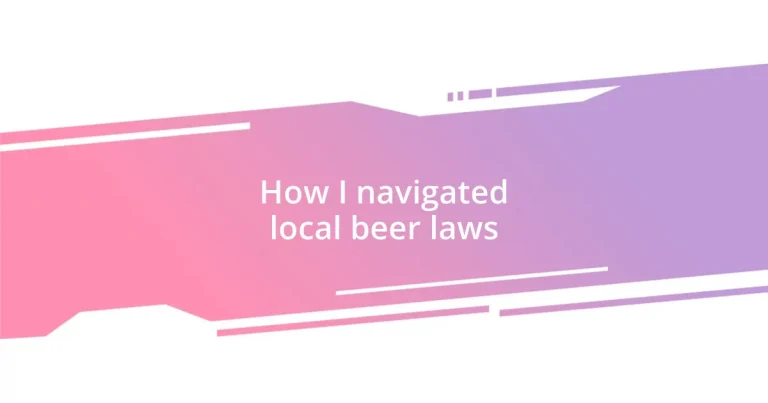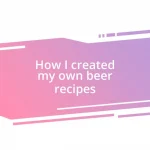Key takeaways:
- Understanding local beer laws requires exploration and knowledge of regulations, as they can vary significantly by neighborhood.
- Connecting with local breweries, homebrew clubs, and community events fosters a supportive network and deeper understanding of compliance.
- Navigating licensing involves meticulous preparation and can be enhanced through relationships with local officials for valuable insights and mentorship.
- Staying updated on changing laws is critical; using social media and attending local meetings can facilitate engagement and knowledge sharing within the brewing community.
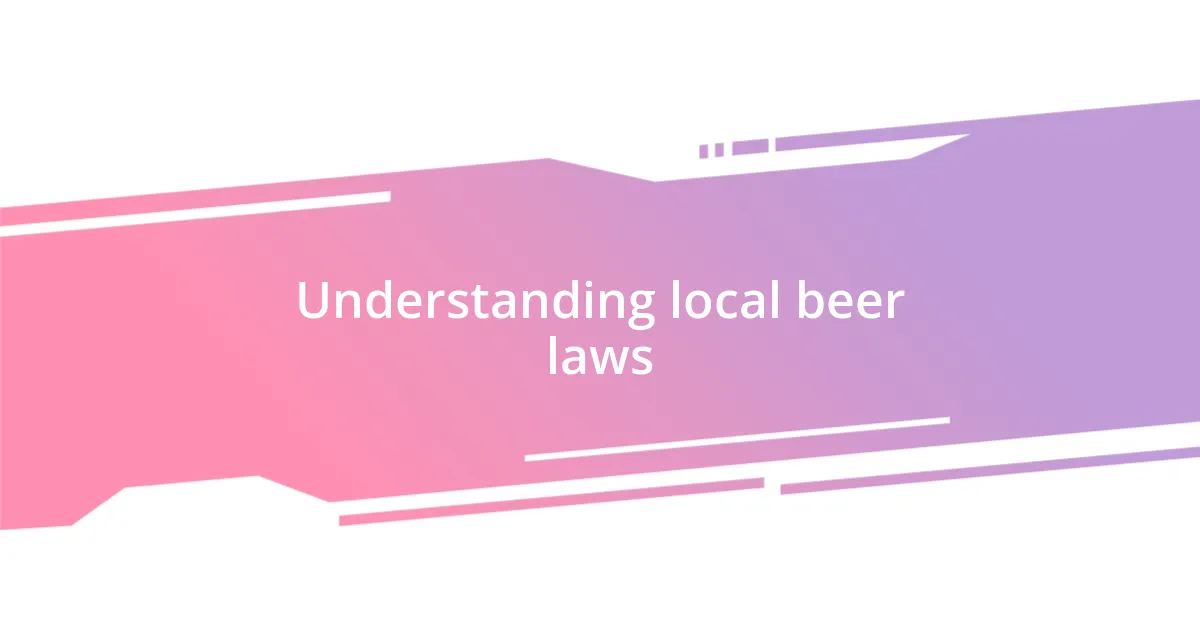
Understanding local beer laws
Understanding local beer laws can feel like deciphering a complex puzzle. When I first moved to my current city, I was surprised by the variety of regulations that seemed to change from one neighborhood to the next. For instance, did you know that some areas restrict the hours during which alcohol can be sold? It’s a detail that can impact your weekend plans if you’re not aware of it.
In my experience, diving into these laws has been eye-opening. Learning that breweries often have specific licensing requirements pushed me to appreciate all the hard work that goes into crafting our favorite local brews. There’s something exhilarating about knowing the rules of the game as you explore the beer scene—whether it’s understanding the difference between a brewpub and a taproom or navigating the restrictions on outdoor beer gardens.
Have you ever tried to plan a gathering and discovered too late that your favorite spot can’t serve alcohol? I did once, and it was both a frustrating and enlightening moment. It made me realize just how critical it is to understand local laws—beyond just being savvy, it’s about truly supporting the businesses that enrich our community.
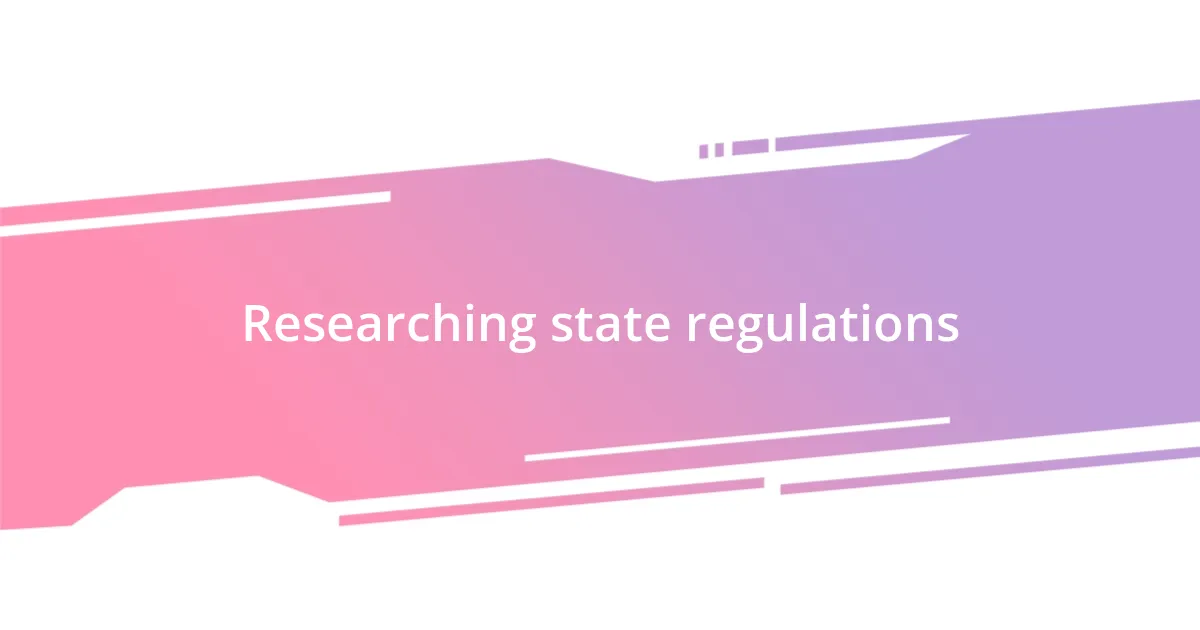
Researching state regulations
Researching state regulations can feel like peeling back layers of an onion. I still remember sifting through the complicated web of laws when I decided to start a small craft beer club. Each state’s regulations can vastly differ in what constitutes as legal homebrewing amounts, and even the tax implications can leave you scratching your head. For instance, I once discovered that my neighbor was able to produce five times as much homebrew without a license in their state—a little irritating, but it also sparked a curiosity to learn more.
What struck me was how essential it is to leverage resources that illuminate these laws. Websites like the National Conference of State Legislatures (NCSL) acted as my flashlight in this labyrinth, helping me uncover the particulars of my state’s laws on alcohol distribution and consumption. I spent countless hours reading legislative texts and even reached out to local breweries. These tiny interactions made me feel more embedded in the community, shifting from just an observer to an informed participant eager to engage respectfully with local brewers and tap into a vibrant culture.
As I navigated through regional laws, I realized that connecting with local representatives can provide insights that aren’t available online. I recall a humbling moment when I attended a city council meeting and listened to passionate discussions about upcoming regulations. It made the whole process feel more approachable and less overwhelming, revealing the importance of being proactive rather than reactive in understanding beer laws.
| State | Key Regulation |
|---|---|
| California | Allows homebrewing for personal use up to 100 gallons annually. |
| Texas | Homebrewing is legal but limited to 200 gallons for personal use. |
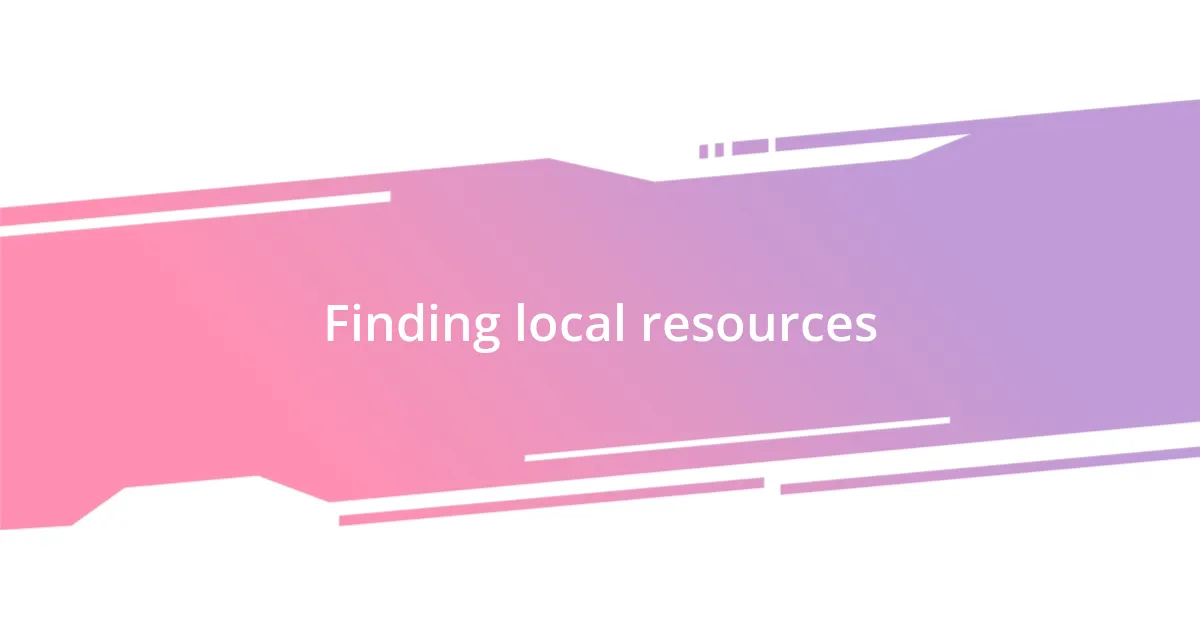
Finding local resources
Finding local resources is a crucial step in navigating the often-unfamiliar territory of beer laws. I recall my first visit to the local homebrew shop, where the owner shared his wealth of knowledge about state-specific regulations. He even pointed out how local breweries operate and where to find the best resources for learning about the laws affecting them. It was not just about shopping; it felt like uncovering a hidden gem filled with friends who cared about craft beer as much as I did.
To aid in your search for local resources, consider these avenues:
- Local Breweries and Taprooms: Many have knowledgeable staff who can provide firsthand insights.
- Homebrew Clubs: Join these communities to gain valuable information from seasoned brewers.
- Community Events: Attend festivals or tastings where regulations and local laws might be discussed.
- Online Forums: Websites and social media groups dedicated to local beer enthusiasts often share resources and tips.
- Government Websites: They can provide official regulations and updates that are essential for anyone looking to dive deeper.
I also remember how helpful it was to connect with local beer advocates through social media. One individual reached out after I posted a question about event regulations and offered to meet up to discuss it over a pint. Those conversations deepened my understanding and made me feel like I was part of a supportive network. Engaging with locals not only enhanced my knowledge but also fostered a sense of belonging in a world rich with flavor and camaraderie.
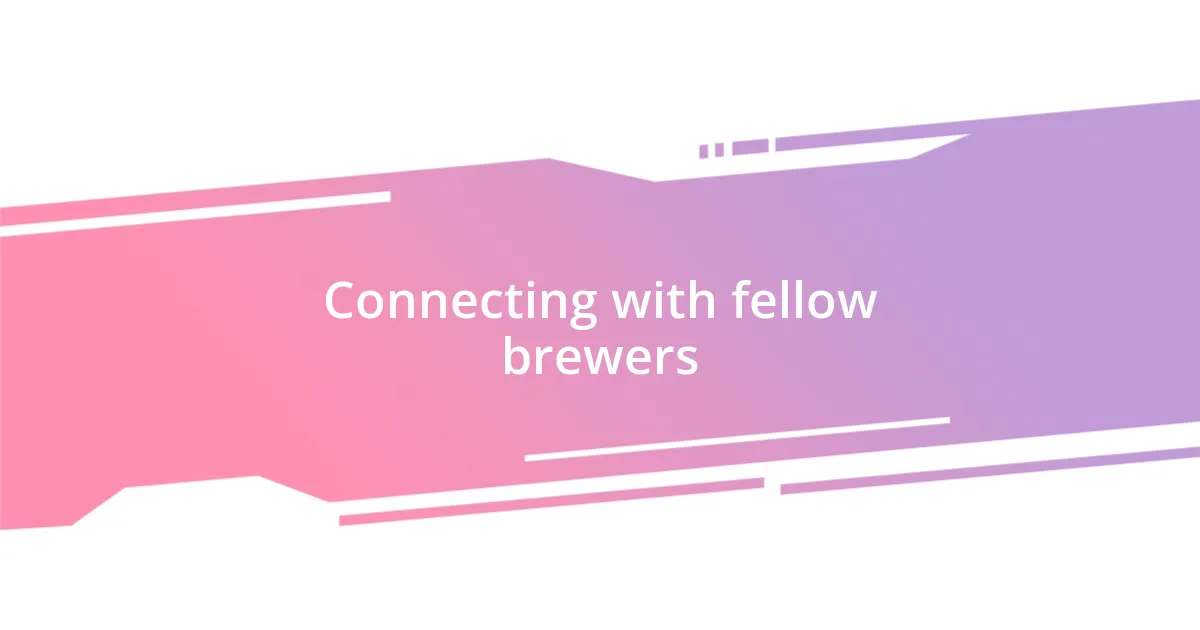
Connecting with fellow brewers
Connecting with fellow brewers has been one of the more rewarding experiences in my journey. I vividly recall my first informal gathering at a local brewery, where I struck up a conversation with a seasoned brewer. He shared stories about his challenges navigating regulations, and I found myself nodding along. Isn’t it comforting to know that we’re all in this together? Those moments of honesty behind the bar can lead to invaluable insights that you won’t find in any book or website.
As I dived deeper into the brewing community, I found that joining a homebrew competition was an excellent way to make connections. I still remember the rush of presenting my beer to a panel of judges, many of whom were local brewers themselves. The feedback I received was honest and constructive, but what surprised me was how open they were to sharing their own experiences. Have you ever felt that thrill of collaboration? It’s both exhilarating and humbling to be surrounded by passionate individuals who encourage your growth while also learning from you.
Networking doesn’t always have to be formal, either. I recall an impromptu conversation at a local beer festival where I met a brewer from another town who had faced similar hurdles in compliance. We spent hours discussing our respective journeys, and I came away with not only new techniques but also new friendships. Isn’t it amazing how beer can bring people together? This sense of community ignited my passion and commitment to supporting fellow brewers, reminding me that while beer may be a solitary craft at times, it’s collaboration that truly brings the flavor.
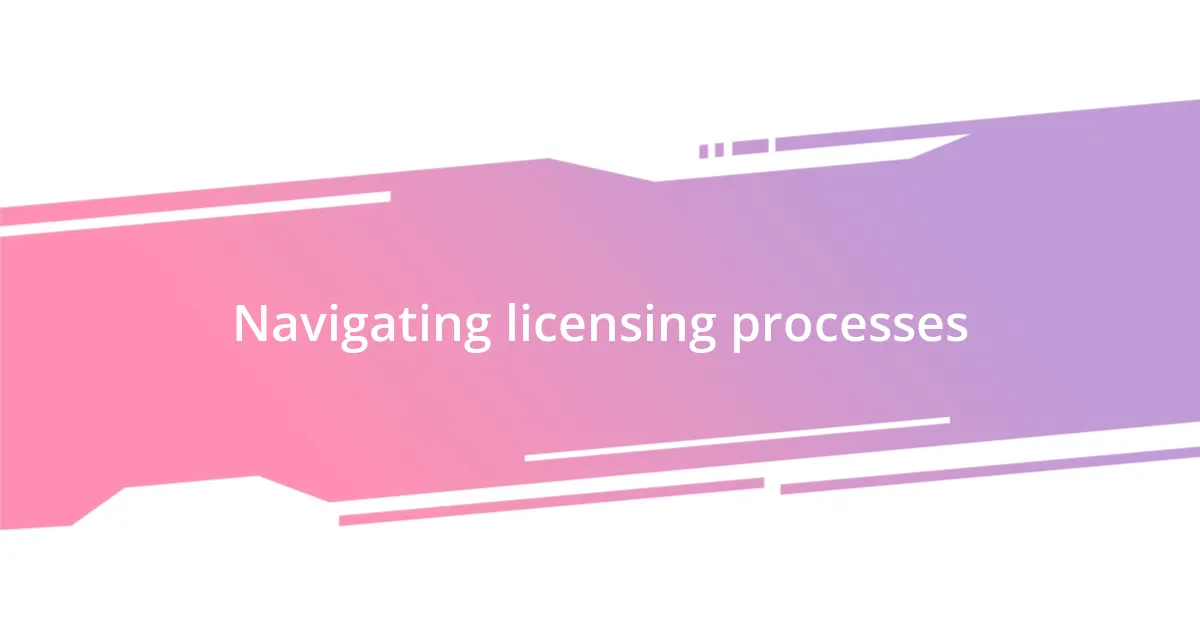
Navigating licensing processes
Navigating licensing processes can feel overwhelming, but I found it to be a path filled with learning opportunities. I recall the day I filled out my first brewery license application—my palms were sweaty, and I was convinced I would miss some crucial detail. However, as I meticulously reviewed each requirement, I realized that those regulations weren’t there to trip me up but rather to ensure safety and quality in our vibrant brewing community. Isn’t it reassuring to think that these rules exist to protect everyone?
As I immersed myself in the process, I learned to break down the steps. I created a checklist of the required documents, including local permits, health inspections, and zoning approvals. This approach transformed a daunting task into manageable bites. It felt empowering to check off each completed item, turning what once seemed like an insurmountable challenge into a series of achievable goals. Have you ever turned a challenge into a game? It can really lighten the mood and make the process much more enjoyable.
Interacting with local licensing officials also became a surprisingly valuable part of my journey. During one fateful visit to the city office, I met a clerk who not only reviewed my paperwork but also shared tips on avoiding common mistakes. Her genuine passion for helping local businesses thrive was evident, and it made me feel more supported in what can often feel like a bureaucratic maze. Isn’t it great when you can find someone who genuinely wants to see you succeed? This connection proved invaluable, turning what might have been a one-time transaction into a lasting mentorship.
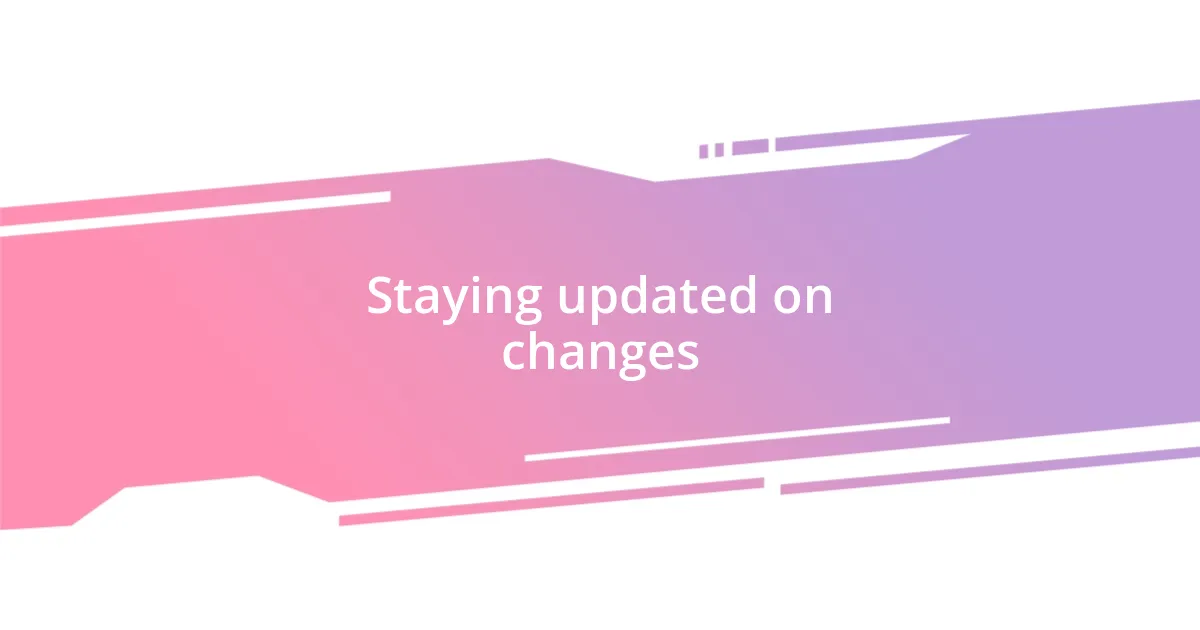
Staying updated on changes
Staying updated on local beer laws is a bit like keeping pace with a moving target—it requires consistent effort and vigilance. I remember the moment I realized that laws can change overnight; one morning, I woke up to an email alerting me about significant updates to our local brewing regulations. It felt like I was playing a never-ending game of catch-up. Does that sound familiar? It struck me then how essential it is to stay connected to local government resources and newsletters.
In my experience, social media has also been pivotal in keeping up with the evolving landscape of local beer laws. I follow various industry organizations on platforms like Twitter and Facebook, which often share timely updates and insights. I also participate in relevant online forums, where discussions range from newly enacted laws to personal experiences. Have you ever felt a sense of camaraderie in these virtual spaces? It’s reassuring to know that by sharing our stories, we’re not just learning for ourselves but contributing to a collective knowledge base that benefits everyone in the brewing community.
Attending local council meetings and industry events opened my eyes to the behind-the-scenes work that shapes our laws. I vividly recall one meeting where passionate arguments about proposed regulations unfolded. It was a bit intense, but seeing members of our brewing community come together, advocating for their interests, made me realize how crucial it is to be not just an observer but an active participant. Have you ever felt empowered by speaking up for something you care about? Engaging in these discussions has not only broadened my perspective but also enriched my commitment to responsible brewing practices.

Tips for compliance and success
A solid understanding of your local beer laws is essential for compliance and success. Early on, I made it a routine to meet with other brewers in my area. Sharing experiences over a pint often led to helpful insights about navigating regulations I hadn’t considered. Have you ever found that a casual conversation can spark some of the best ideas? These informal gatherings served as a reminder that we’re all in this together.
Additionally, I created a reference guide that outlined the most critical regulations I needed to remember. I used color coding for different categories—such as health codes, licensing requirements, and sales restrictions. This personal touch not only made the guide visually appealing but also made it easier for me to recall important information at a glance. I often refer to this guide when questions pop up, and it’s been instrumental in avoiding any compliance mishaps. Have you ever designed your own tools to simplify a task? It can turn cumbersome processes into manageable ones!
Lastly, I can’t stress enough the importance of building good relationships with local inspectors and regulators. I scheduled regular check-ins even when I wasn’t facing an inspection; it helped establish trust and communication. I remember one visit where the inspector gave me tips on improving safety measures that I hadn’t even considered—little things that made a big difference. When have you found that proactive communication paid off in unexpected ways? Cultivating these relationships ultimately enhanced my business practices and confidence in navigating the ever-evolving landscape of beer laws.












